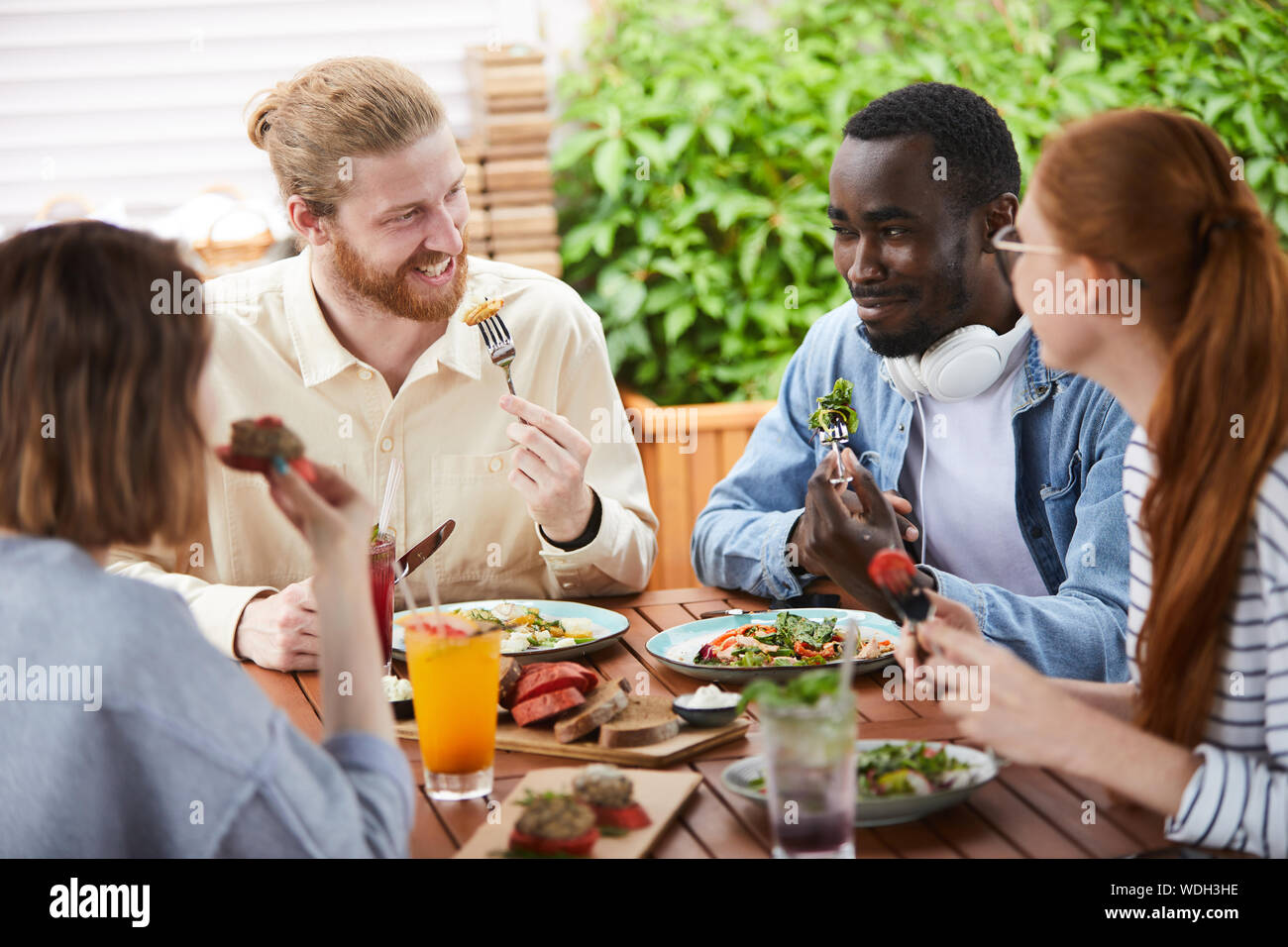Exploring The **Eating Cats And Dogs Meme**: What It Really Means Online
The internet, as we know, is a vast place where ideas, funny pictures, and sometimes, rather intense discussions pop up. One topic that seems to come back around, causing quite a stir, is the idea of eating cats and dogs. This isn't just about what someone has for dinner; it's become a recognizable internet moment, often used to make a point or spark a debate. It’s a meme, in a way, that brings up strong feelings and different ideas about animals and food across the globe. You might have seen it pop up in comments or on social media, sparking all sorts of reactions, and it really gets people talking.
This recurring theme, the "eating cats and dogs meme," often highlights the differences in how various cultures view animals, particularly those we keep as pets in some parts of the world. It’s a very sensitive subject, and understandably so, because people have deep connections with their animal companions. When this meme appears, it often serves as a way to challenge or question common beliefs about what is okay to eat and what is not. It’s a bit of a mirror, showing us our own biases and assumptions about food and tradition.
So, what’s behind this online phenomenon? Is it just for shock value, or is there something more to it? We’ll look into where this idea comes from, why it keeps showing up online, and what it tells us about how people think about food and animals. It’s a conversation that, honestly, goes much deeper than a simple internet joke, touching on culture, ethics, and even how our minds process different food choices.
- Unveiling The Delights Of Mango Mousse Cake A Whole Foods Odyssey
- Uncover The Secrets Of Skip The Game Odessa A Journey Of Discovery
- Unveiling The Origin Of Jamal Musiala Embracing Diversity And Inspiring Dreams
- Wi Wi Wi Cat
- Bianca Lawson Unraveling The Enigma Of Motherhood
Table of Contents
- Understanding the "Eating Cats and Dogs" Meme
- Cultural Tapestry: Food and Tradition
- Ethical Dilemmas and Food Choices
- The Internet Amplifier
- Navigating the Conversation
- Frequently Asked Questions
- Moving Forward with Food Discussions
Understanding the "Eating Cats and Dogs" Meme
The "eating cats and dogs meme" isn't a single image or video; it's more of a concept or a recurring theme in online discussions. It typically appears when people are talking about cultural differences, animal rights, or simply trying to provoke a reaction. Sometimes, it’s used to point out what some see as hypocrisy in Western dietary habits, like eating pigs or cows but being shocked by the idea of consuming dogs or cats. It’s a way to say, "Why is one animal okay to eat, but another isn't?" That, is that, a really complex question for many.
This idea, you know, often comes up in debates about food ethics. People will bring it up to challenge others' comfort zones regarding what they consider acceptable food sources. It’s a very charged topic, because for many, cats and dogs are seen as family members, not as livestock. The meme, in a way, forces a direct confrontation with these deeply held beliefs.
Its impact online is pretty big. It can quickly lead to heated arguments, cultural misunderstandings, and even, sadly, prejudice. The meme, therefore, isn't just a funny picture; it’s a powerful tool that can highlight significant divides in how people view the animal world and our place within it. It’s a bit of a shock tactic, really, to get people to think about their food choices.
- Unveiling Sanaa Lathans Net Worth Discoveries And Insights
- Unlocking The Secrets Is Scottie Scheffler Married
- Tori Dunlaps Net Worth Unlocking The Secrets Of Financial Success
- Brianna Keilars Pregnancy Journey Uncovering Surprising Truths
- Uncover The Unbeatable Polar Vantage V3 Review And Pricing Insights Revealed
Cultural Tapestry: Food and Tradition
Food traditions are, you know, incredibly diverse around the world. What one group considers a staple, another might find completely foreign or even unacceptable. This difference is at the very heart of the "eating cats and dogs meme." For a long, long time, people have eaten what was available and what their culture deemed appropriate.
Historical and Regional Views
In some parts of the world, historically and even today, certain animals that are pets elsewhere have been a source of food. This practice often comes from necessity, tradition, or simply different cultural norms that developed over hundreds, or even thousands, of years. For example, in some Asian countries, dog meat has been part of the diet for centuries, just as beef or pork is in other places. This isn't, you know, a universal practice within those regions, and it's often a minority one, but it exists.
It’s important to understand that these traditions are often deeply woven into the fabric of a society. They are not, by any means, random choices. They reflect historical survival, local resources, and cultural development. To understand this, it’s helpful to look at how different societies developed their eating habits. What we eat, after all, is a big part of who we are, culturally speaking.
The history of food is very complex. What was once eaten out of necessity might become a delicacy or a traditional dish over time. Conversely, what was once common might become taboo. This, you know, ebb and flow of food practices really shapes how we see different animals and their role in our diets.
The Role of Pets in Society
The strong reaction to the "eating cats and dogs meme" largely comes from the modern Western idea of pets. For many, cats and dogs are not just animals; they are companions, part of the family, and often treated with a great deal of affection and care. This bond, you know, is very powerful.
This perspective is, however, relatively recent in its widespread form. Historically, animals often had more functional roles, even if they were also loved. The idea of a pet as purely a companion, rather than also serving a purpose like hunting or guarding, has become more common in many places. This shift in how we view these animals significantly shapes our emotional responses to the idea of consuming them.
When people hear about eating cats or dogs, it can trigger a very visceral reaction because it goes against their deeply ingrained beliefs about these specific animals. It’s a challenge to their personal framework of what is right and wrong when it comes to animal treatment and food. This, you know, emotional connection is a big part of why the meme generates such strong feelings.
Ethical Dilemmas and Food Choices
The "eating cats and dogs meme" often brings up some really tough ethical questions. If you eat a cow or a pig, why is it different from eating a dog or a cat? This is a question that, you know, gets people thinking about their own food choices and the ethics behind them.
The Argument of Consistency
Many who use or discuss the meme point to what they see as an inconsistency in how different animals are treated. They argue that if one animal is acceptable to eat, especially if it's intelligent or capable of feeling pain, then why isn't another? This line of reasoning tries to make people examine their own biases. It’s a very direct challenge to the idea of speciesism, which is the idea that one species is more important than another.
This argument can be quite uncomfortable for people because it forces them to confront their own dietary habits and the moral reasoning behind them. It asks, in a way, for a consistent ethical framework for all animals, not just the ones we label as "pets." This, you know, can lead to some deep reflection for many.
When we think about food, we often categorize animals without much thought. We have "food animals" and "pet animals." The meme, you know, blurs those lines and asks us to justify why those lines exist in the first place. It's a question that has no easy answers, and that's precisely why it sparks so much debate.
Emotional Responses to Food
Our relationship with food is incredibly complex. It's not just about getting nutrients; it's tied to culture, family, comfort, and deeply held beliefs. As my text says, "Overview eating disorders are serious health conditions that affect both your physical and mental health,These conditions include problems in how you think about food." While the meme isn't about eating disorders, the intense reactions it causes highlight how deeply our thoughts about food are connected to our mental well-being and how we process information.
When confronted with the idea of eating an animal we consider a pet, people can experience strong emotional distress. This isn't just a simple dislike; it can be a profound feeling of disgust or moral outrage. This reaction is a bit like how some people "restrict or severely" limit their food choices based on strong personal beliefs or health goals. The intensity of the feeling, in a way, shows how central these ideas are to our sense of self and our moral compass.
The feelings evoked by this meme can be very strong, almost like a mental discomfort. Just as "excessive belching or flatus, along with bloating, pain or swelling of the belly, can sometimes interfere" with comfort, a deeply challenging idea about food can interfere with a person's mental peace. It's a challenge to their established comfort zone regarding what is acceptable to eat. This, you know, emotional aspect is a huge part of the meme's power.
The Internet Amplifier
The internet is, you know, a huge place where ideas can spread incredibly fast. The "eating cats and dogs meme" is a perfect example of how a sensitive topic can become amplified and sometimes distorted online. It’s like a giant megaphone for all sorts of opinions.
How Memes Spread and Evolve
Memes, generally speaking, spread because they are relatable, funny, or provocative. The "eating cats and dogs meme" falls into the provocative category. It grabs attention because it touches on something many people feel very strongly about. Once an idea like this gets out there, it can be reshaped, reinterpreted, and used in many different contexts.
This evolution means that the original intent behind the meme can get lost. It might start as a serious ethical question, but then it could turn into a way to troll people or simply to shock. The speed at which it travels across platforms, from social media to forums, means that its meaning can change rapidly, too. It's a bit like a game of telephone, where the message gets altered with each retelling.
The very nature of online communication, with its quick shares and short attention spans, lends itself to the spread of such impactful, yet simple, ideas. It's very easy to share something that makes you feel something strong, and this meme, you know, certainly does that for many.
Misinformation and Prejudice
Sadly, the "eating cats and dogs meme" can also lead to a lot of misinformation and, in some cases, outright prejudice. When people lack a full understanding of different cultures, they might jump to conclusions or generalize about entire groups of people based on isolated practices. This is a real problem.
The meme can be used to fuel negative stereotypes or to demonize cultures that have different food traditions. This happens when people focus solely on the shock value without trying to understand the historical or cultural context. It can create division and hostility online, which is not, you know, what anyone wants.
Combating this requires a commitment to learning and understanding. It means looking beyond the surface-level provocation and seeking out reliable information about diverse practices. It’s important to remember that a meme, you know, rarely tells the whole story.
Navigating the Conversation
Talking about sensitive topics like the "eating cats and dogs meme" can be tough. It often brings up strong emotions and deeply held beliefs. But, you know, it’s also an opportunity to learn and grow.
Fostering Understanding
Instead of reacting with anger or judgment, approaching these discussions with a desire to understand can make a big difference. This means asking questions, listening to different perspectives, and recognizing that not everyone shares the same cultural background or values. It’s about building bridges, not walls.
Learning about different food systems and cultural practices can help broaden our own perspectives. For instance, understanding why certain animals are consumed in specific regions can help demystify the practice. It’s a chance to see the world through someone else’s eyes, even if you don’t agree with their practices. You can learn more about food culture on our site, which can help.
When we talk about food, we often think about health, too. My text mentions, "10 great health foods the food you eat every day can make a difference in your health,Diet affects your risk of getting some cancers, heart disease or type 2 diabetes." While this meme is about cultural differences, the underlying principle of understanding diverse diets applies. A broader view of food, you know, can help us be more open-minded.
Responsible Online Discourse
When engaging with the "eating cats and dogs meme" or similar topics online, it’s really important to be thoughtful. This means checking facts, avoiding generalizations, and trying to have respectful conversations, even when you disagree strongly. It’s about being a good digital citizen.
Think before you share. Does what you’re posting contribute to understanding or just more division? Are you spreading accurate information or just repeating something you heard? These questions are, you know, crucial for creating a better online environment.
It’s also important to remember that behind every screen is a real person. Treating others with kindness and respect, even when discussing uncomfortable topics, is always the best approach. You can find more information about online etiquette on this page.
Frequently Asked Questions
Here are some common questions people ask about this topic.
Why do some cultures eat dogs and cats?
Historically, some cultures consumed dogs and cats out of necessity, as a food source when other options were scarce, or as part of long-standing traditions. These practices are often tied to specific regions and cultural heritage, not universal across entire countries or continents.
Is eating cats and dogs illegal everywhere?
No, it is not illegal everywhere. Laws vary significantly by country and even by region within countries. In many Western nations, it is illegal, but in some parts of Asia, for instance, it is still legal, though often a minority practice and subject to increasing debate and regulation.
How can I learn more about different food cultures respectfully?
You can learn by reading books, watching documentaries, or visiting reputable cultural websites. Seek out information from diverse sources that offer nuanced perspectives. Engaging in respectful conversations with people from different backgrounds can also be very enlightening. A good place to start might be exploring resources on cultural anthropology or food studies. For example, you could look at academic articles or trusted non-profit organizations that focus on cultural understanding. National Geographic Culture provides some good insights into diverse human practices.
Moving Forward with Food Discussions
The "eating cats and dogs meme" serves as a powerful reminder of how different our world views can be, especially when it comes to something as fundamental as food. It highlights our varying relationships with animals, the strength of cultural traditions, and the powerful emotional responses these topics can bring up. As we’ve explored, these discussions go far beyond a simple online joke, touching on ethics, history, and deeply personal beliefs.
Understanding the context behind such a provocative meme allows us to move past immediate shock and into a space of more thoughtful discussion. It’s a chance to consider our own biases and to approach global differences with a bit more curiosity and less judgment. In a world that is very connected, finding ways to talk about our differences with respect is, you know, very important for everyone.
Ultimately, this meme, in a way, pushes us to think about what we eat, why we eat it, and how our personal views fit into the much bigger picture of global food practices. It’s a conversation that, you know, really encourages a broader perspective on what ends up on our plates and why.
As of 2024, these discussions continue to evolve, reflecting ongoing shifts in global awareness and cultural exchange. The meme itself, you know, will likely keep appearing as long as these fundamental differences in perspective exist.
- Unveil Hidden Truths Embark On A Journey Of Discovery With I Have No Knowledge Of Any Of This
- Unlock Exclusive Snoop Dogg Updates Uncover Contact Secrets
- Unveiling Beverly Dangelo A Journey Of Talent Resilience And Enduring Legacy
- Unveiling Missy Elliotts Net Worth Surprising Discoveries And Financial Insights
- Unveiling The Enigmatic Wicked Witch Of The East Discoveries And Insights

Essential Tips To Help Your Teens Develop Healthy Eating Habits

Eating Only Fruits And Vegetables Until Dinner at Christy Calvin blog

Group of friends talking and smiling to each other while eating meal at